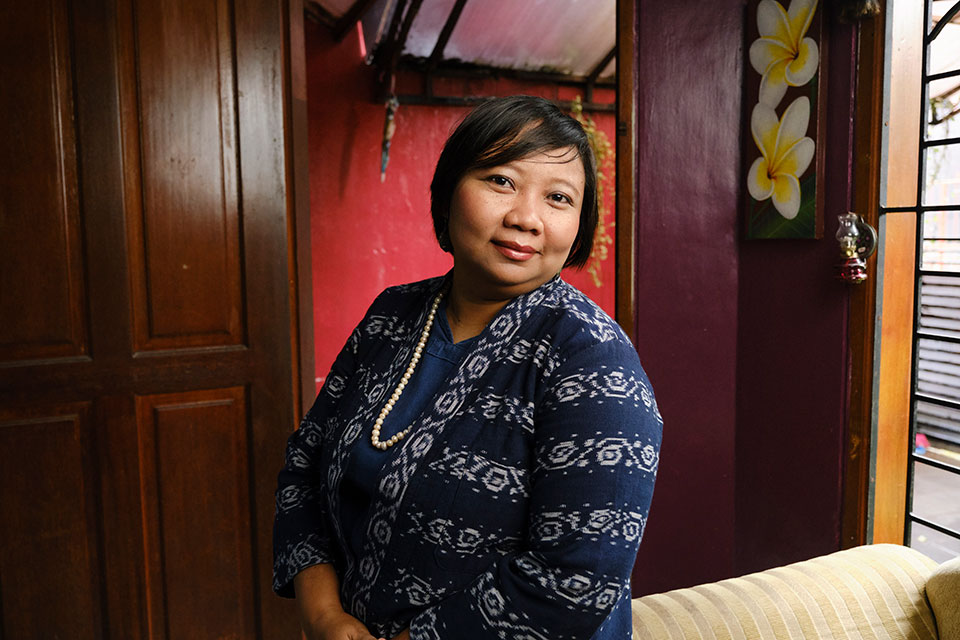Gaining protection for Indonesia’s migrant workers and their families
Millions of Indonesians working abroad now have hard-won legal protection against exploitation, thanks to the work of pioneering campaignersDate:

Anis Hidayah was still a student when she picked up the newspaper one morning and read the story of a local woman who had left her young children in Indonesia to work thousands of miles away in one of the Gulf States. There she was exploited, beaten and raped by her employer. When she came home, she was treated as a social outcast and her young family was humiliated and ostracized.
“That story lit a fire within me,” says Hidayah. “That could have been my mother, my family. This was one story, but there are millions of others suffering the same all over the country.”
Indonesia has one of the world’s largest migrant worker communities. In 2016, an estimated 9 million Indonesians were working abroad. Half were women, the majority employed in the informal sector as domestic workers.
Hidayah says that many families in Indonesia anticipate that at least one adult will seek work abroad, as they believe this is their only opportunity to boost their earning potential and secure their children’s education and life opportunities. In the village where she grew up, many of Hidayah’s friends were raised by grandparents while their parents lived overseas. “I realized that this was my community and my problem as well,” she says.

In 2004, Hidayah and a group of other human rights activists started Migrant Care, which fights for better protection for Indonesia’s migrant workers. Today, the organization receives more than 1,000 calls every year from workers or families needing help.
Related stories
“Life as a migrant worker, especially when it comes to domestic work, can be unsafe in many different ways,” says Hidayah. “They are exploited, made to work excessive hours, have no access to food or proper rest and face sexual harassment and assault.”
For more than 12 years, Migrant Care fought for overseas workers to be better protected under Indonesian law. In 2017, the Government passed new legislation that for the first time guaranteed some basic rights to workers migrating through official channels.
“The new legislation, while not perfect, is a huge victory for us,” says Hidayah. One of the most significant provisions Migrant Care had successfully campaigned for was curtailing the power of recruitment agencies in the migration process.
“Before, the recruitment agents had the mandate, which was often abused, to provide departing workers and their families with information about their rights,” says Hidayah. Now this training takes place at village level, she explains, with the communities themselves taking the lead role in ensuring safer migration flows.
Migrant Care is assisting villages in this process, running safe migration workshops for locals about to move abroad, including assistance with their contracts and information about their legal rights in their destination countries and where to get help if they find themselves in trouble.
It is also helping villages to provide support for the children left behind. “We need to know, for example, if a child stops going to school or if they are being treated badly at home while a parent is abroad,” says Hidayah. “We are helping to implement systems that place their welfare in the community’s hands, making sure the families of domestic workers are included in village development planning and budget programmes. In this way, the whole village is taking collective responsibility.”
Migrant Care’s focus is not just domestic. 2017 also saw the signing of the landmark Association of Southeast Asian Nations (ASEAN) Consensus on the Protection and Promotion of the Rights of Migrant Workers, in which governments from 10 countries across the region promised to strengthen social protection, access to justice and the human rights of millions of overseas workers in both countries of origin and destination.
While this is a triumph for the region’s civil society groups, Hidayah says there is still urgent work to be done. One of Migrant Care’s priorities is to fight for the rights of the millions of undocumented workers—those who migrate for work through unofficial channels— excluded from the Consensus and left unprotected and unacknowledged by their governments.

It is a complex and sensitive issue. Since 2015, Indonesia has banned informal workers, including domestic workers, from travelling to work in 20 countries where they face high levels of abuse and exploitation. Yet millions of Indonesians—mostly women—still travel illegally as undocumented workers on the promise of employment, leaving their families back home with little access to justice if anything happens to them abroad.
“We view undocumented workers from a human and labour rights perspective, but this view is still not reflected in the politics or laws of our country or our region,” says Hidayah. “Yet the advances of the last few years are giving us the confidence that we really can work towards lasting and sustainable change even on this issue.”
Originally published in UN Women's flagship report, Progress of the World’s Women 2019-2020: Families in a Changing World

